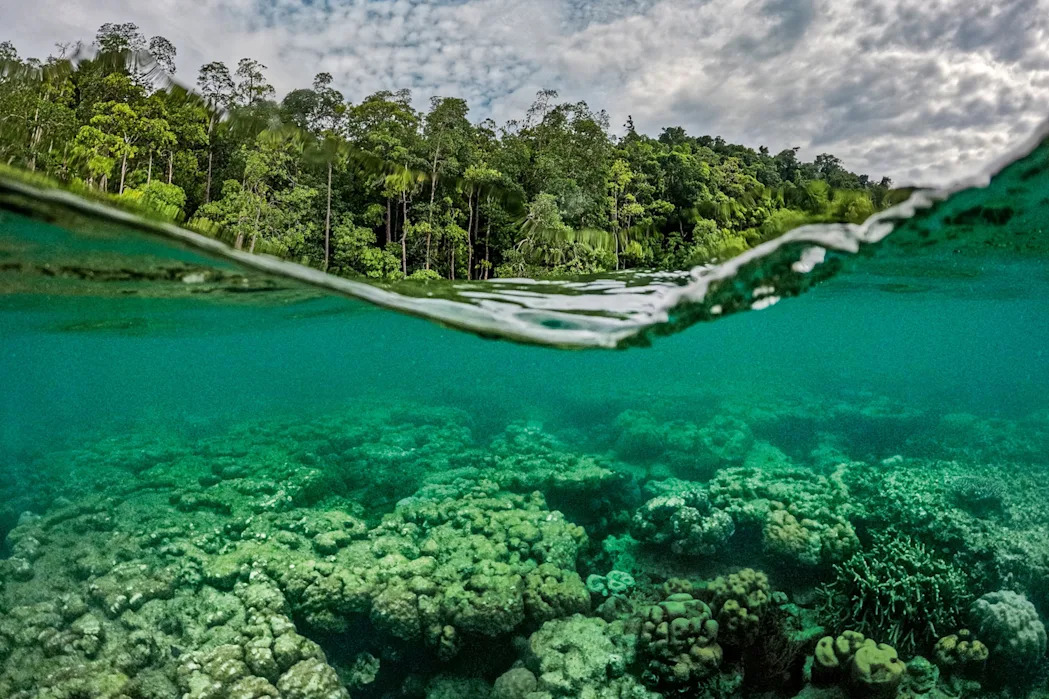The coral reefs of Raja Ampat, located in Southwest Papua, Indonesia, are not only a biodiversity hotspot but also hold deep cultural significance for local communities. A recent expedition, led by marine conservationists from the grassroots NGO The Sea People, showcases the unique ecosystems and the ongoing efforts to restore and protect these underwater gardens.
Snorkeling in the waters off Yenbuba village, participants experienced a vibrant underwater world teeming with life. The sound of snapping shrimp, likened to “pouring milk on Rice Krispies,” fills the air as divers explore the coral-covered seabed. The region is home to an astounding 75% of the planet’s coral species, significantly more than the Caribbean and the Great Barrier Reef. According to local marine biologist Lisa D’Silva, some areas in Raja Ampat boast 100% coral cover.
The coral gardens of Raja Ampat not only support diverse marine life but also play a critical role in the livelihoods of local communities. Lynn Lawrance, co-founder of The Sea People, emphasized the importance of these reefs for fishing populations and potential pharmaceutical developments. The organization’s coral restoration initiatives involve transplanting healthy coral fragments to degraded areas, allowing communities to take an active role in their ecosystem’s preservation.
The expedition was part of a new conservation voyage organized by Rascal, a liveaboard tour operator. Over five days, participants learned about the local marine environment and the challenges faced by the reefs, including rising sea temperatures and human activity. “Yenbuba is a site that gets quite a lot of human pressure,” Lawrance noted, highlighting the impact of fishing, coral mining, and pollution on reef health.
During their exploration, the group witnessed the effects of coral bleaching, a phenomenon exacerbated by climate change. Yet, data from The Sea People suggests that Raja Ampat’s corals have shown surprising resilience. Lawrance explained that successful coral transplants from this area might help restore reefs globally in the future.
The expedition also featured insights from local marine biologist Cornelia Junfaly Patty, known as Cori, who is among the first homegrown marine biologists in Raja Ampat. Raised in the nearby village of Yenbekwan, she expressed the importance of educating locals about marine life. “I grew up here on the reef, but I didn’t know how to identify what I was seeing,” she shared.
The conservation efforts aim not only to restore coral but also to empower local communities. By teaching residents effective coral gardening techniques, The Sea People is fostering a sense of ownership and responsibility towards the reefs. Lawrance dreams of a future where coral gardening becomes a respected profession, akin to that of dive instructors.
The underwater journey also included visits to significant cultural sites. In Mayalibit Bay, local guides shared the profound connections between the community and their environment, rooted in tribal legends and spiritual beliefs. The area is home to sacred rivers and the remnants of ancient warriors, illustrating the deep historical ties that locals have with their natural surroundings.
As the expedition continued, participants engaged in coral gardening activities, planting over 80,000 coral fragments at the site known as Yaf Keru. The restoration work has transformed the underwater landscape into a thriving ecosystem. Observers noted the diverse coral structures, each contributing to the rich tapestry of marine life.
The experience was not just about conservation; it was also a celebration of the natural beauty of Raja Ampat. Each day began with breathtaking sunrises and ended with stunning sunsets over the ocean, creating a serene backdrop for exploration. The clear waters and unique wildlife, including the elusive epaulette shark, provided unforgettable moments for the divers.
In witnessing the intricate relationships between the ocean and the communities that depend on it, participants gained a deeper appreciation for the delicate balance of marine ecosystems. The stunning coral reefs of Raja Ampat serve as a reminder of the beauty of nature and the urgent need for its protection, both for future generations and for the cultural heritage of Indonesia’s coastal communities.
As the expedition wrapped up, the sense of urgency surrounding coral conservation remained palpable. The knowledge shared by local experts and the vibrant marine life encountered serve as both an inspiration and a call to action for all who venture into these sacred waters.
